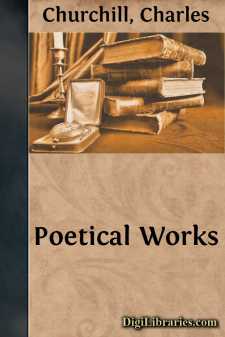Categories
- Antiques & Collectibles 13
- Architecture 36
- Art 48
- Bibles 22
- Biography & Autobiography 813
- Body, Mind & Spirit 142
- Business & Economics 28
- Children's Books 17
- Children's Fiction 14
- Computers 4
- Cooking 94
- Crafts & Hobbies 4
- Drama 346
- Education 46
- Family & Relationships 57
- Fiction 11829
- Games 19
- Gardening 17
- Health & Fitness 34
- History 1377
- House & Home 1
- Humor 147
- Juvenile Fiction 1873
- Juvenile Nonfiction 202
- Language Arts & Disciplines 88
- Law 16
- Literary Collections 686
- Literary Criticism 179
- Mathematics 13
- Medical 41
- Music 40
- Nature 179
- Non-Classifiable 1768
- Performing Arts 7
- Periodicals 1453
- Philosophy 64
- Photography 2
- Poetry 896
- Political Science 203
- Psychology 42
- Reference 154
- Religion 513
- Science 126
- Self-Help 84
- Social Science 81
- Sports & Recreation 34
- Study Aids 3
- Technology & Engineering 59
- Transportation 23
- Travel 463
- True Crime 29
Poetical Works
Description:
Excerpt
CHURCHILL—HIS LIFE AND WRITINGS.
In Churchill we find a signal specimen of a considerable class of writers, concerning whom Goldsmith's words are true—
"Who, born for the universe, narrow'd their mind,
And to party gave up what was meant for mankind."
Possessed of powers and natural endowments which might have made him, under favourable circumstances, a poet, a hero, a man, and a saint, he became, partly through his own fault, and partly through the force of destiny, a satirist, an unfortunate politician, a profligate, died early; and we must approach his corpse, as men do those of Burns and Byron, with sorrow, wonder, admiration, and blame, blended into one strange, complex, and yet not unnatural emotion. Like them, his life was short and unhappy—his career triumphant, yet checquered—his powers uncultivated—his passions unchecked—his poetry only a partial discovery of his genius—his end sudden and melancholy—and his reputation, and future place in the history of letters, hitherto somewhat uncertain. And yet, like them, his very faults and errors, both as a man and a poet, have acted, with many, as nails, fastening to a "sure place" his reputation and the effect of his genius.
Charles Churchill was born in Vine Street, Westminster, in February 1731. He was the eldest son of the Rev. Charles Churchill, a rector in Essex, as well as a curate, and lecturer of St John the Evangelist, Westminster. As to the attainments of the poet's father, we know only that he was qualified to superintend the studies of the son, during the intervals of public tuition. At eight years of age, he was sent to Westminster School, and placed under the care of Dr Nichols and Dr Pierson Lloyd, where his proficiency in classical lore was by no means remarkable; nor did he give any promise of the brilliance which afterwards distinguished his genius. At fifteen, he stood as candidate for admission to the foundation at Westminster, and carried it triumphantly. Shortly after, having by some misdemeanour displeased the masters, he was compelled to compose, and recite in the school-room, a poetical declamation in Latin, by way of penance. This he accomplished in a masterly manner—to the astonishment of his masters, and the delight of his school-fellows—some of whom became afterwards distinguished men. We can fancy the scene at the day of the recitation—the grave and big-wigged schoolmasters looking grimly on—their aspect, however, becoming softer and brighter, as one large hexameter rolls out after another—the strong, awkward, ugly boy, unblushingly pouring forth his energetic lines—cheered by the sight of the relaxing gravity of his teachers' looks—while around, you see the bashful tremulous figure of poor Cowper, the small thin shape and bright eye of Warren Hastings, and the waggish countenance of Colman—all eagerly watching the reciter—and all, at last, distended and brightened with joy at his signal triumph.
At the age of eighteen, he stood for a fellowship in Merton College, but without success—being defeated by older candidates....


